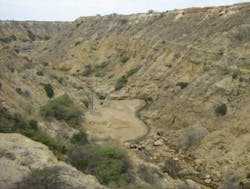A migration has begun among large companies-particularly those in the power utility, oil and gas and mining sectors-to replace and/or enhance existing serial communications systems with wireless Ethernet systems. Brazil's state-controlled energy company Petroleo Brasileiro S.A., known as Petrobras, is automating Supervisory Control and Data Acquisition (SCADA) applications in several countries following a successful pilot program in Peru. Given the rugged terrain and environmental conditions, selection of the right radio was essential.
Petrobras Energia Peru S.A., based in Lima, Peru, engages in exploration and production of crude oil and natural gas. Its pilot project was designed to test the feasibility of using wireless radios to communicate with pipeline flow computers in the field. Wireless radios, installed at 18 different test site locations, were to report to a gateway and then into a SCADA system.
The challenge of the installation was communication among sites that are located in gullies, canyons or wadis. In some cases, the wellheads are located deep inside the wadi, without clear line-of-site (LOS) to the receiver and subject to signals echoing off canyon walls. Small rivers and large amounts of rain in the summer add to LOS difficulty, as does the temperature. The coastal environment in Piura, Peru has an average temperature of 35 degrees C (95 degrees F).
According to Project Engineer Carlos Cieza, Petrobras Peru engineers attempted for several weeks to get the network working, but the radios they were using caused large amounts of ambient noise and failed to establish reliable or consistent links. The link would be available for 2 to 3 seconds and then would be dropped.
"Without working links, we would have to consider the pilot a failure," said Cieza.
Petrobras Peru already had oil collection sites, treatment plants, water ejection sites and compression stations using wireless radios from FreeWave Technologies (http://www.freewave.com), a Boulder, Colo. maker of spread spectrum and licensed radios specifically for the oil & gas industry.
When the radios for the pilot project wasn't successful, engineers remembered that they had several older models of FreeWave FGR09CSU serial radios and HTplus Ethernet radios in a warehouse not being used. "So we decided to install them in an attempt to save the pilot," Cieza said. "After a quick set-up, we were able to establish a link almost immediately. We were extremely impressed with the flexibility and reliability of FreeWave's radios, especially considering how difficult it had been to set up the other vendor's radios."
Given the rugged terrain and harsh environmental conditions, selection of the right radio was essential.
According to Roy Rosado, FreeWave Technologies business development executive for Latin American Markets, what makes FreeWave radios different is "better sensitivity, which lets us make more reliable links at greater distances. The pilot radio was good quality, but it had lower sensitivity and a higher noise floor. The noise and signal would bounce off the walls of canyon and not allow the radio to make a highly reliable link."
The board level radios provide a cost-effective solution that allows users to incorporate wireless communications into a wide variety of applications, said Rosado. Additionally, the radios offers a variety of interface options including, a 6 vdc to 30 vdc operating voltage, a temperature range of -40 degrees C to +75 degrees C, surface mount design and no additional radio frequency (RF) shielding needed.
"The trend is to move to Ethernet devices for communications," says Rosado. "Controllers and PLCs now have Ethernet ports. If they have an Ethernet port, they have the ability to be operated remotely, which is a huge benefit for companies like Petrobras. If you have responsibility for 100 wells, you can get an alarm on your smartphone when something is wrong and fix it right away. Also, if you have wireless Ethernet communications, you can also have voice over Internet Protocol (IP) and IP security camera systems."
Renee Robbins Bassett, [email protected], is Managing Editor of Automation World magazine.
For more oil and gas products and applications, see http://www.automationworld.com/automation-strategies/oil-and-gas
About the Author
Renee Bassett
Managing Editor

Leaders relevant to this article:
